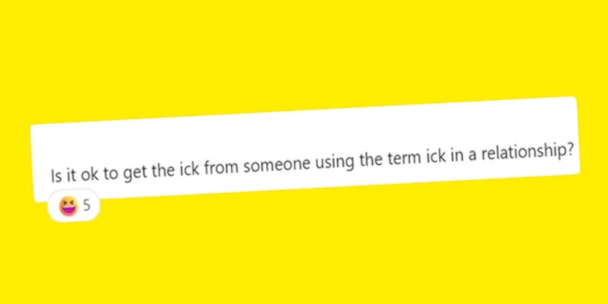You can run, you can hide, but you can’t escape ‘the ick’
McCann London planner Jo Costello gives her thoughts on how brands can tap into this modern dating colloquialism and resonate with younger audiences, as seen in recent campaigns from Tinder and Nando’s.

What do you think about brands tapping into ‘The Ick’? / McCann London
Ever been on a few dates with someone and suddenly, inexplicably, there’s something about them that disgusts you to your core? If so, then you may have fallen prey to ’the ick’. Death to all sexual attraction, capital punishment for a relationship, the ick – derived from the word icky – is a ’cringe’ moment that suddenly puts you off someone. It’s irrational and unpredictable – and it’s prevalent in modern dating.
Advertisement
The ick is a widespread phenomenon understood well by millennials and gen Z. The ick is an untapped resource for building an instant connection with this audience. We noticed this first-hand during our Atomic Soup brainstorming session, where the 140 global McCanners in attendance started furiously hammering the chat and jumping on video. That’s when we really saw the potential of harnessing the ick.
One of the earliest mentions of the ick was an edition of American Newsweek magazine in 1979, using the expression interchangeably with the ’yuck factor’. Fast forward to 2017 and Olivia Attwood propelled the term into popular culture during the third season of Love Island. Today, the ick is woven into the heart of modern love. It’s the lifeblood of dating memes. TikTok returns 252m views of #TheIck. Social posts depicting the most pathetic reasons for developing the ick (owning a printer, holding an umbrella, the way someone’s boyfriend’s body flailed around during a car crash) have spread far and wide. The absurd reasons why people get the ick make for great comedic content. Sometimes you haven’t experienced the specific ick yourself but, for some bizarre reason, you relate.
There are some fascinating hypotheses behind why we develop the ick. Your subconscious could be signaling red flag alarm bells. It could be a maladaptive defense mechanism; spotting icks might protect you from falling for someone and getting hurt. External factors might be at play. The paradox of choice might render you unfathomably picky because you believe someone better is a few swipes away.
Some might consider the ick a symptom of the increasingly bewildering nature of modern dating. In an anxiety-inducing era of ghosting, benching and breadcrumbing, people are as afraid of giving someone the ick as they are of developing it for someone.
Advertisement
Catching the ick is, arguably, as traumatic as giving it when you think you’ve found someone fantastic. They tick lots of boxes, you have a wonderful first date, you spend the six days until you see them again fantasizing about the enchanting bond that’s sure to flourish... Then when you do see them you clock their disgusting shoes and know immediately that it’s all over.
This icky conundrum often leads to the premature termination of a budding relationship. And that’s quite sad. Especially as some identifiable icks are based on transitory details. An ugly shirt, weird trousers, slightly-too-funky footwear. Are we taking icks too far? Are we, as a culture, making dating more difficult than it needs to be?
There’s an emerging trend of overcoming the ick. A few days ago, Marie Claire released an article on ’5 easy steps to get over the ick’. Articles by the Metro, Dazed and GQ, as well as content creators on platforms such as YouTube, have recently discussed navigating the curse of the ick.
The desire to overcome the ick could be a rich area for brands. Besides the obvious suspects, such as dating apps, this could be an engaging insight for retail or travel brands.
Suggested newsletters for you
It’s often said that holidays predict relationship compatibility. Holidays are bound to unearth every conceivable ick. Imagine a travel brand following a fresh relationship across the globe, dramatically honing in on the icks as the couple discover and navigate them. They might even learn to like the things that initially appalled them.
On the flip side, that ugly shirt, those weird trousers and that slightly-too-funky footwear make a person. Our behaviors and mannerisms are uniquely ours. As we discussed in Atomic Soup, there’s something lovely about flipping icks on their head and embracing them. They are something wonderfully you. Someone else’s ick is someone else’s treasure. Tinder recognized this in its ’You’re Not for Everyone’ TV ad in 2021. Harnessing the insight that flaws can be repositioned as quirks, it dramatized negative traits. It’s a funny ad. It disrupts the conventional dating marketplace that focuses on the dating experience.
Flipping the ick could be an interesting insight for beauty brands. Picture someone getting ready for an event, such as a date, and their internal monologue starts misbehaving, feeding them lies about their appearance or personality. A brand could encourage people to embrace their unusual qualities and inspire self-confidence.
The ick is interwoven into Nando’s new brand platform. Recognizing its restaurant experience is utterly unique and that it is the UK’s favorite date spot, Nando’s featured the ick to build a connection with a gen Z audience. In ’This Must Be the Place,’ a woman gets the ick when her date finds Nando’s medium sauce too spicy. Partnering with LadBible and hosted by comedian Munya Chawawa, Nando’s created a three-part series helping young people navigate the complex world of modern dating, referring to the ick throughout.
Our Atomic Soup session brought to light the cultural richness of the ick. It evokes passionate relatability. Icky truths are fertile ground for consumer connection. We identified language as a tool to build a meaningful role in the lives of millennials and gen Z. So, how will your brand harness the ick epidemic?
Jo Costello is a planner at McCann London.

